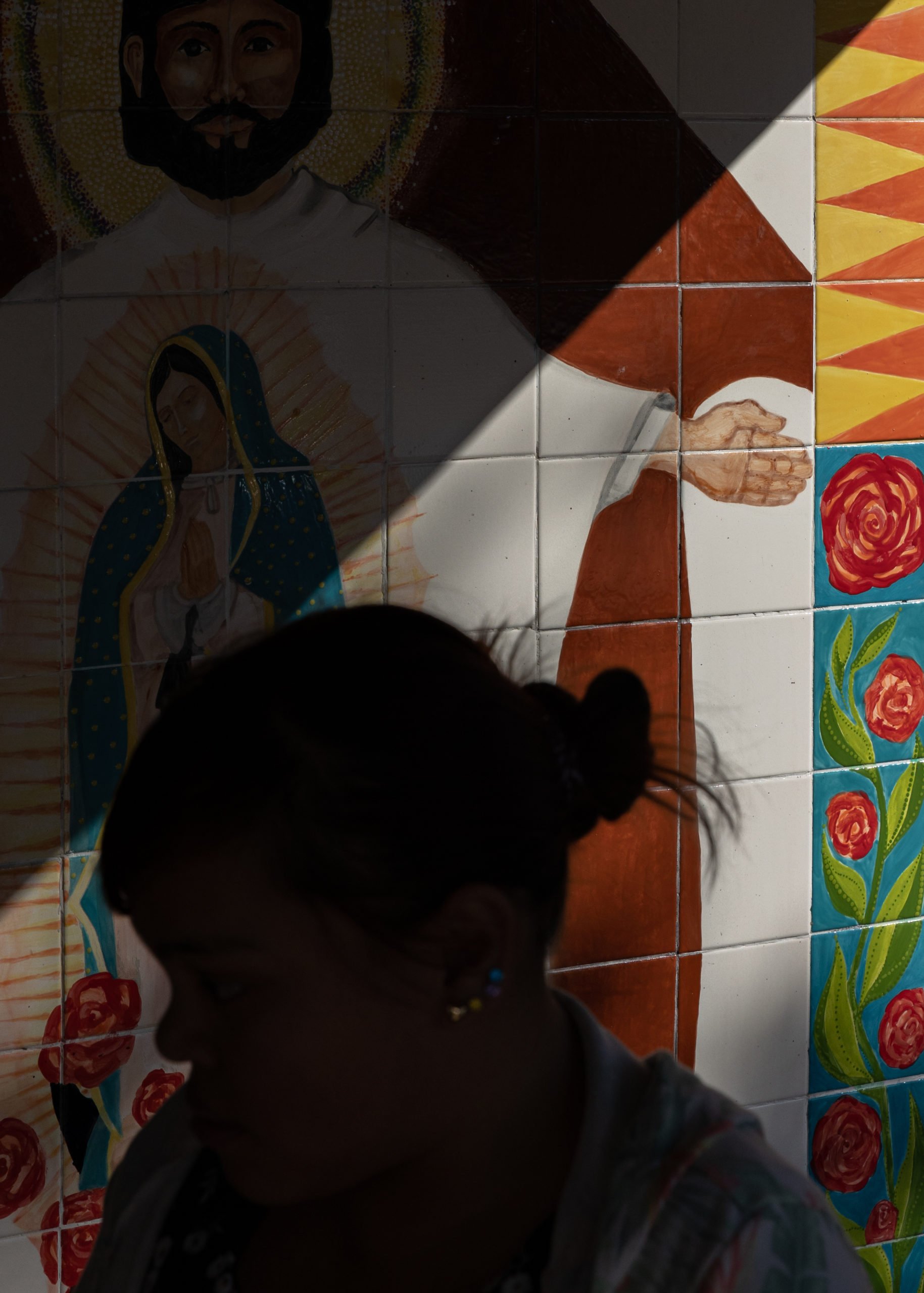On an early Houston morning, cars with their trunks popped open line up in front of Casa Juan Diego, just south of Washington Avenue. Casa Juan Diego primarily exists to serve migrants and refugees—referred to as huéspedes, or “guests”—fleeing violence and poverty in their home countries, but today there is a role reversal. Casa (as its volunteers call it) also distributes food sent from the Houston Food Bank to food-insecure Houstonians. Today, it’s the guests, mostly Venezuelans, who load the food into the Houstonians’ cars.
Before they begin, Louise Zwick, director and co-founder of Casa Juan Diego, asks a guest to lead them in prayer. Afterward, Zwick, 80, always dressed in no-nonsense black and often using a cane, returns to her office to face the day’s challenges while the guests and volunteers hand out frozen chicken, bags of rice and beans, and vegetables and fruits.
A Venezuelan asks how long a box is supposed to last. “It’s not enough for a week,” a Spanish-speaking volunteer answers. “But it’ll help.”
“In Venezuela, this would have to last a month,” he replies, shaking his head.
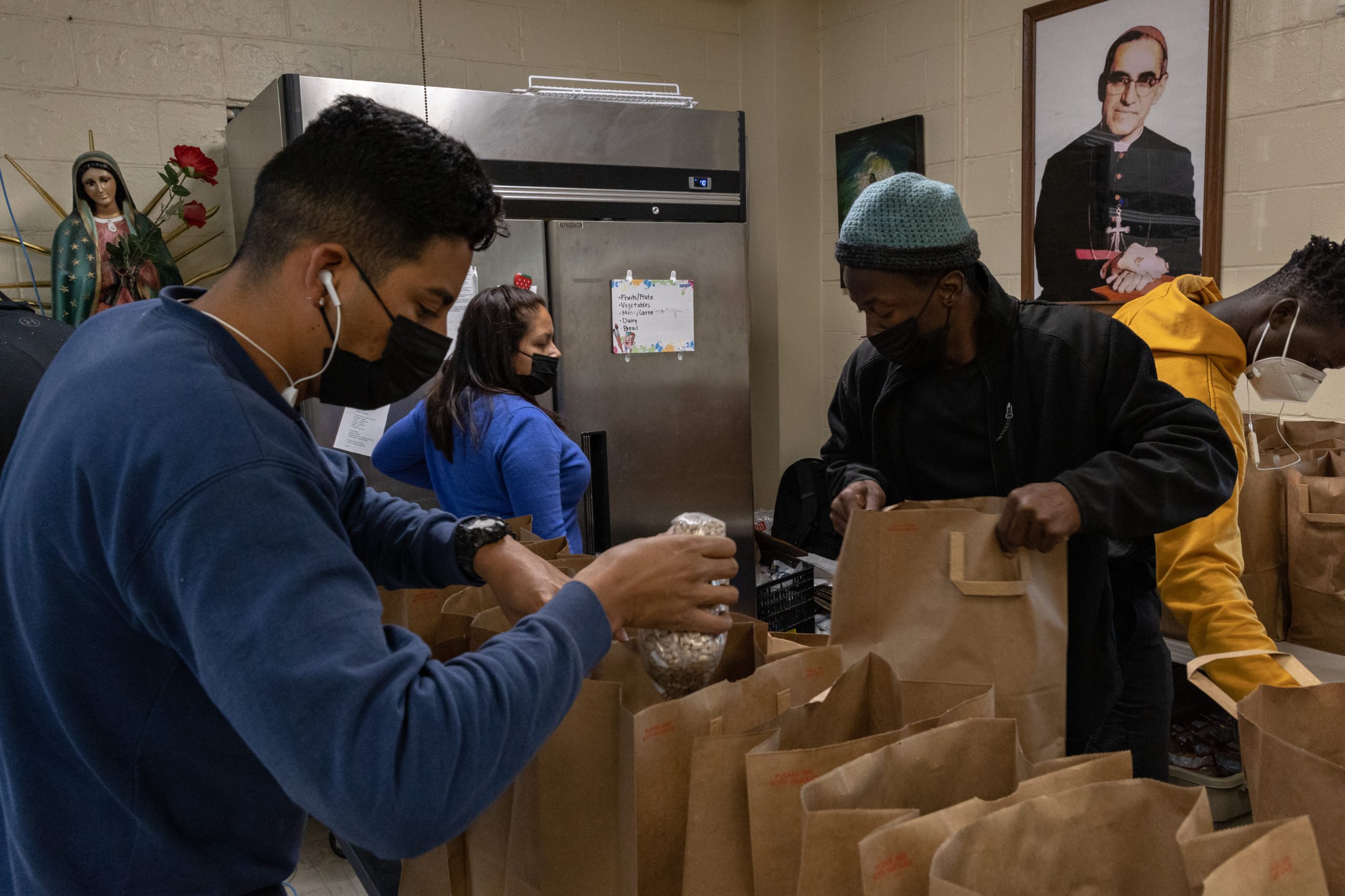
More than 6 million Venezuelans have fled that country’s political oppression and broken economy in recent years. Until recently, most had remained in nearby countries such as Colombia. Increasingly, however, many are trekking toward the United States. There, after much suffering on the road, they are often dehumanized and turned into political props. But the stunts of Governor Greg Abbott and Florida Governor Ron DeSantis don’t tell the whole story of how these migrants are received. Flying well below the media radar are outposts of compassion like Casa Juan Diego, where volunteers embrace periods of elective poverty in service to the poor—or, in Zwick’s case, a lifetime of it—and where the migrants themselves are sometimes able to serve others and restore their own humanity.
Casa is a Catholic Worker house founded in 1981 by Zwick and her late husband Mark, a former priest, on the principles laid down by the legendary Dorothy Day and her mentor, Peter Maurin. The Zwicks had recently returned to the United States from a hazardous 1977 move to El Salvador, undertaken with their two young children, Joachim and Jennifer. Before El Salvador, the Zwicks were devout Catholics living a middle-class life in California. Mark was a psychiatric social worker and Louise a librarian, but they had steadily increased their devotion to the poor since their marriage in 1967.
As the Zwicks’ commitment to a radically Catholic life deepened, they were inspired to join the comunidades de base [base communities], in which small groups of Christians banded together to form their own “church” in places like El Salvador. In 1977 the family moved to a poor barrio, a neighborhood, in San Salvador where they performed various volunteer activities and participated in study groups while living in a house whose walls “didn’t quite meet” and where “there was no glass in the windows,” as the Zwicks wrote in their 2010 memoir Mercy Without Borders. Louise supervised the children’s reading and gave them violin lessons, and they all “suffered from intestinal diseases.” But they soon had brushes with the increasingly violent agents of the Salvadoran government and decided to leave. They were willing to expose their children to poverty, but not death squads.
(Joachim and Jennifer remained attached to Casa over the years. When his father died of Parkinson’s Disease in 2016, Joachim gave up his IT career and moved back to Houston to help out. For a time, Jennifer and her children also lived and volunteered at Casa.)
Mark and Louise arrived in Houston just as refugees from Central America began pouring into the city. The Zwicks agonized over whether to open their own Catholic Worker house. Louise had taken a job as a children’s librarian and would make enough to support the family. So Mark quit his counseling job and they rented the “ugliest building in Houston” on Washington Avenue—then a cheap part of town—and started housing migrants and providing them with food and services. The Zwicks were taking a true leap of faith, as they had almost nothing to offer but a willing spirit and a little space. But, they write, “almost from the beginning people appeared out of nowhere to help.” A doctor offered to start a clinic. A rice company said they had a thousand pounds of rice to spare. A handyman priest spent his vacation installing toilets and showers.
They also believed that they had help from another realm. The Zwicks wrote, “Dorothy Day died … on November 29, 1980. We are pretty sure she went to heaven and arranged for us to be ready” to open their house, which they named after Juan Diego, the Mexican peasant to whom the Virgin of Guadalupe appeared in 1531. The Zwicks chose Diego for his example of humility. To them, he is a “Saint for Nobodies.”
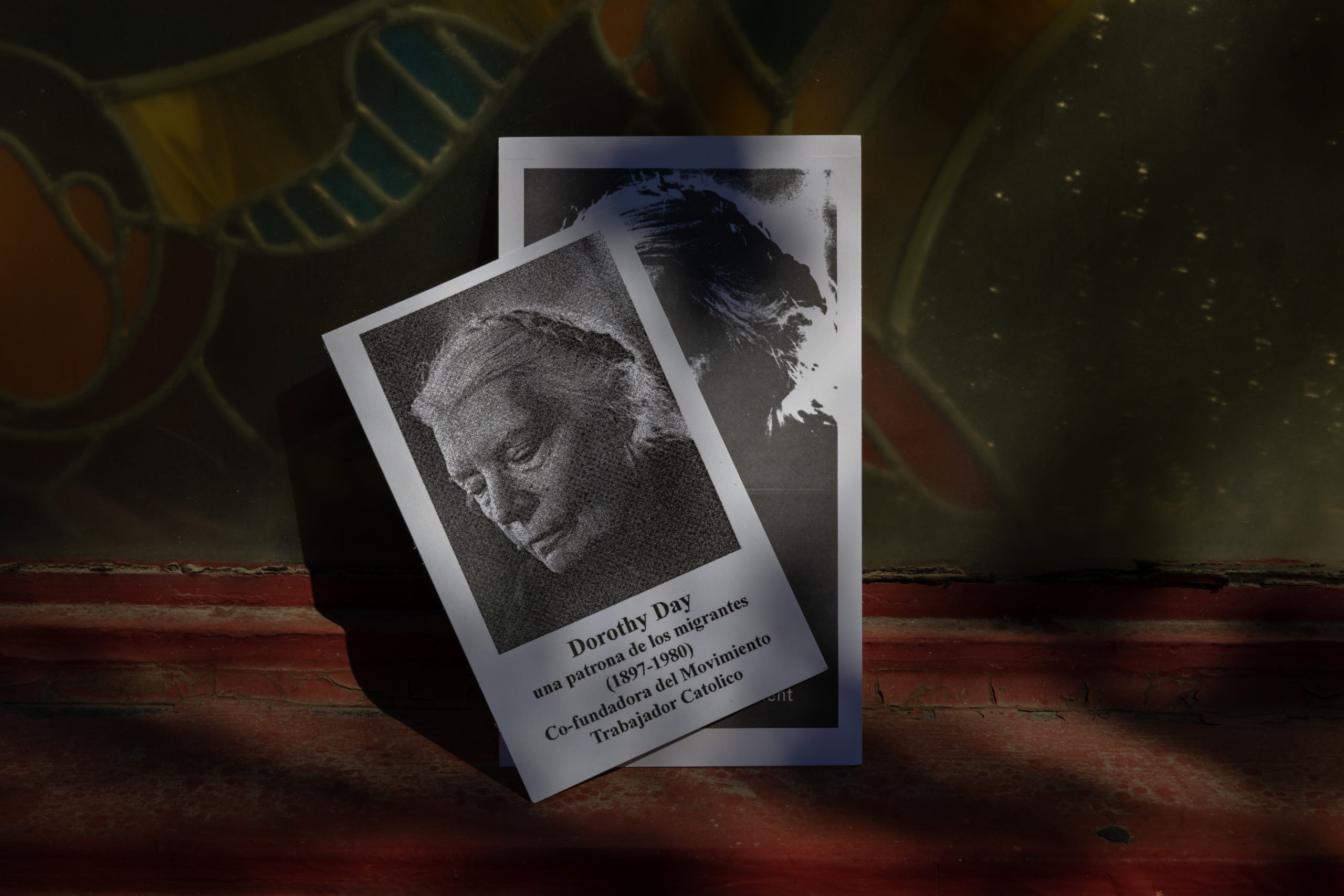
Surprisingly, perhaps, the diocese soon embraced them once they determined that the Zwicks were truly Catholic and not communist. (Whatever the Zwicks’ personal convictions, Casa itself is resolutely apolitical. “We just wish people would be kinder,” Louise says.) Mark was able to visit area parishes to ask for financial contributions and volunteers. Once the Zwicks established both their good intentions and their pragmatic, problem-solving approach to immigration, even law enforcement, including Immigration and Naturalization Services, as Immigration and Customs Enfrocement was previously called, began sending migrants their way.
In May 1981, they published the first issue of their newspaper, the Houston Catholic Worker/ Trabajador Católico de Houston, modeled on Day’s Catholic Worker. In it, they recounted the “stories of the refugees and the adventures of living and working” in Casa along with articles questioning the neoliberal economic order that, in their view, forced migrants to leave their homes.
They were on their way, even if they didn’t know exactly where they were going. When asked where he saw Casa Juan Diego in five years, Mark answered with typically self-deprecating humor: “I don’t even know what I’m doing tomorrow!”
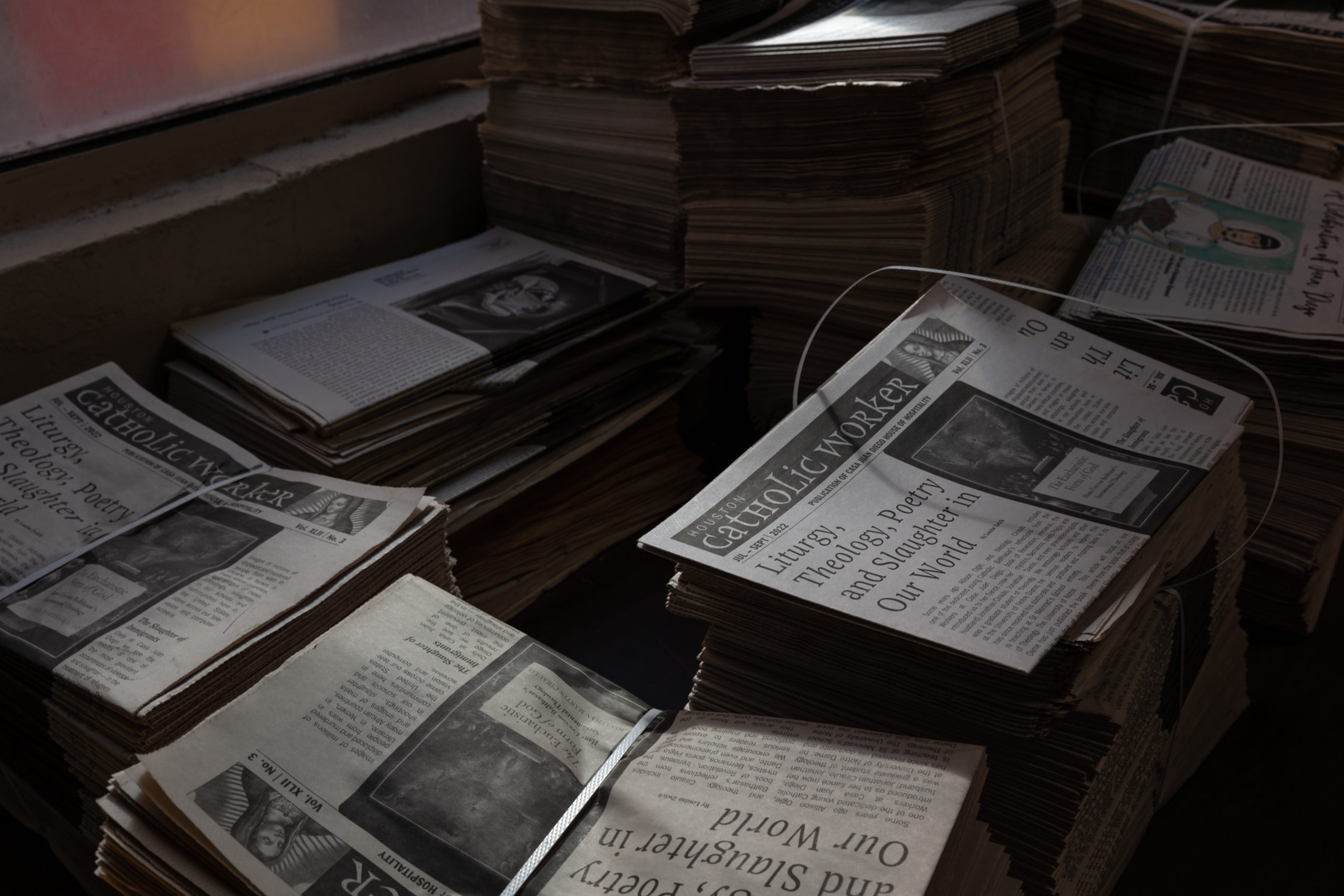
Volunteers come and go from Louise’s office. Dawn McCarty has been a Casa volunteer for 14 years and, with her husband, lives in a nearby Casa house. She also teaches social work at the University of Houston-Downtown. She and Louise are discussing a recently arrived Honduran couple. The husband has cancer and carries a colostomy bag. The wife arrived eight-and-a-half months pregnant and anemic. Once Casa volunteers got some food into her, she felt better and has now given birth. McCarty will navigate the bureaucracy to get the birth registered.
Another Catholic Worker, Marjorie Mika—one of the young, long-term volunteers who come from all over the country after graduating from college (usually Catholic)—enters to say that three of the sick and injured are lining up outside. Disabled undocumented individuals are not eligible for any kind of government assistance, so Casa helps 200 of them with rent and medical expenses. Louise takes out an enormous checkbook and fills out a check for $800 for the rent of a woman who lost both legs to cancer. Louise then writes checks for $700 and $300 to help a young man crippled in a car accident and a man with a severe gastric disorder.
Casa Juan Diego doesn’t accept grants and the bureaucracy that comes with them, so the money for this generosity comes “100 percent from donations.” The newspaper has a worldwide readership of 60,000, which leads to many contributions. One reason the donations go so far is that no one takes a salary—though housing and food are provided for Louise and other long-term volunteers.
Louise remains calm in the middle of the bustle, and despite the frequent very loud clamoring of her phone, she is as unflappable as her husband was; it seems to come with the territory.
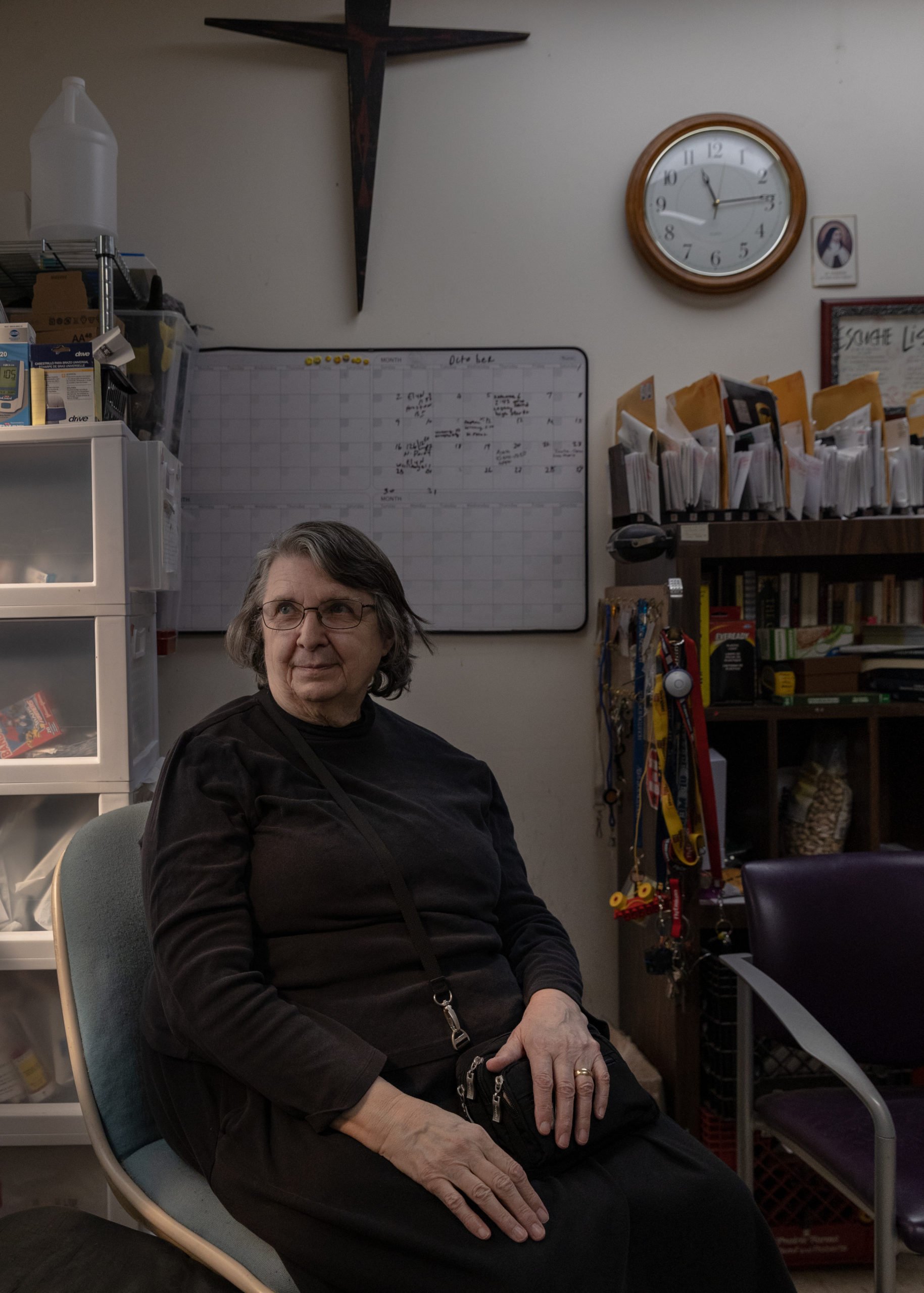
They don’t keep a strict count of guests and volunteers, but Louise estimates that “over 100,000” migrants have spent at least one night at Casa Juan Diego, and that “hundreds” of Catholic Worker volunteers have spent at least several months here. Hundreds more have pitched in one day a week or so.
The numbers of guests ebb and flow with immigration controversies. But on a more-or-less typical night, they house around 100 guests. These days, in fact, Louise says they’ve reached their capacity. “We can’t help everybody,” she says.
The crisis in Venezuela has led to the current upsurge. Louise estimates they make up 90 percent of the guests. “Is there anyone left there?”
To reach the United States, many Venezuelans brave the fearful Darién Gap—the 60-mile stretch of roadless jungle between Colombia and Panama. It’s filled with dense forest, steep mountains, expansive swamps, and criminal gangs. Nobody knows how many have died there, but it’s certainly more than the 50 annually that the Panamanian government reports.
If they manage to reach the U.S. border—the United States has leaned on Mexico to retain many of the migrants—they typically surrender to border agents and request asylum. They are given a court date and are sent to either a sponsor or to a place like Casa Juan Diego and given a year to prepare their asylum case. In other words, the migrants who reach Casa have “papers” and are not here illegally.
Dr. John Butler has spent one morning a week at the clinic for around seven years but is still wide-eyed at what the Zwicks have created. (Other doctors and dentists also come in on a regular schedule.)
“I drive through River Oaks to get here,” he says. “These two worlds are right beside each other, but they have nothing in common.”
Butler treats seven to eight patients a day. Many are like the 16-year-old Honduran who suffered a hit-and-run while out walking. “He came in with multiple abrasions and a fractured arm. We tried to talk him into going to the ER, but his family has a big bill with a hospital and he was reluctant to go.” Other cases are painful to even contemplate, like the boy who fell out of a tree while putting up Christmas lights at a River Oaks mansion and is now paralyzed.
Butler says of the migrants, “They don’t want a handout.” A 60-something man came in with pain in his knees after walking from Honduras. “He talked about wanting to find work. It’s inspirational stuff.” He adds, “I always wanted to do missionary work. Little did I know I just had to drive down the street.”
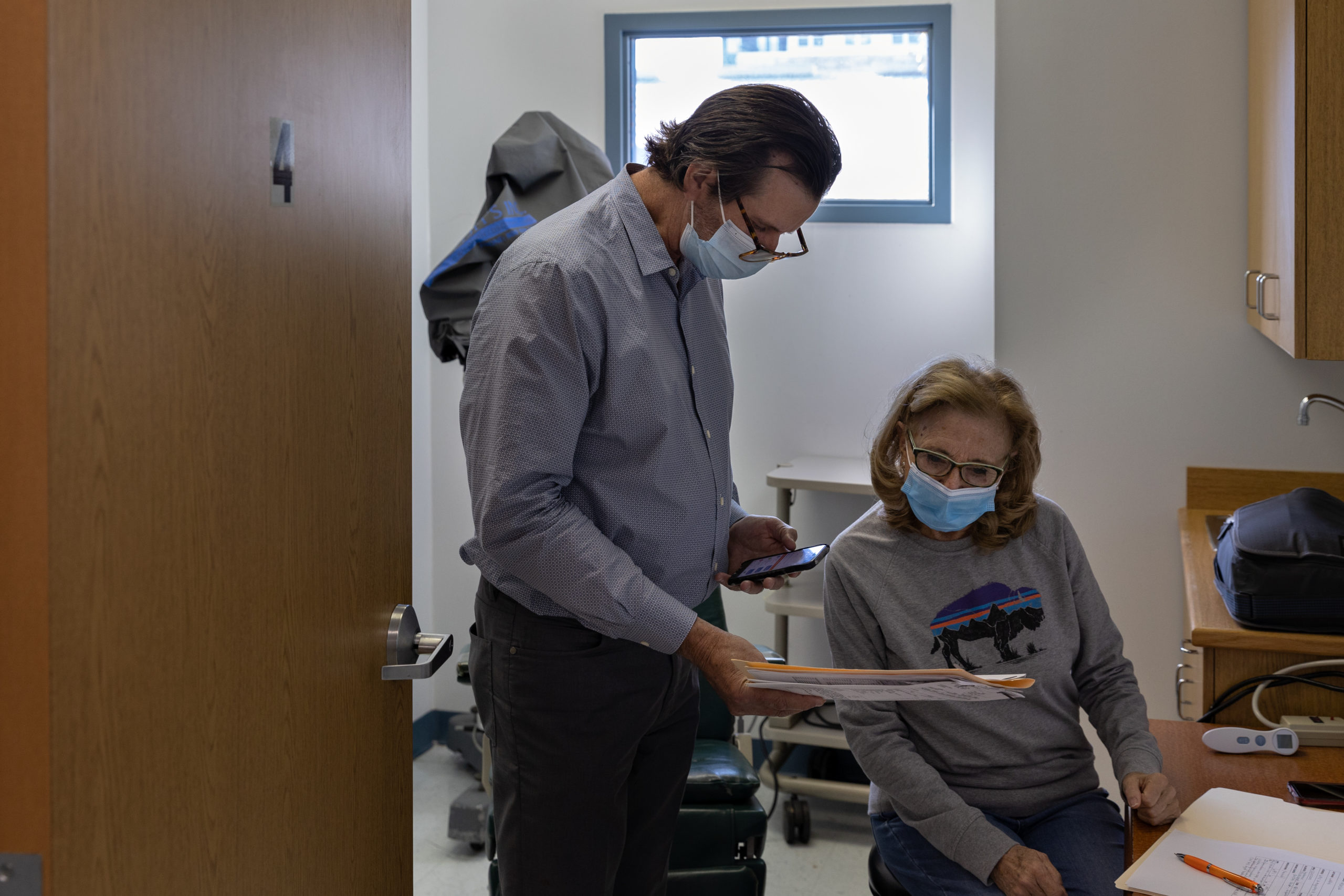
When Annette Baird, originally from the UK, said she wanted to volunteer, Louise asked what her skills were. When Baird answered, “I can cook,” Louise cut her off—“That’s what we need.” Today Baird’s lunch includes spaghetti squash and herbs she took from Casa’s extensive garden.
The volunteers are seated together because today is a discussion session on one of the Catholic Worker sources Mark and Louise included in their co-authored 2005 book, The Catholic Worker Movement: Intellectual and Spiritual Origins. In it, the Zwicks show how certain writers influenced Day and Maurin. Dostoyevsky is an important source. His line from The Brothers Karamazov, “Love in practice is a harsh and dreadful thing, compared to love in dreams,” is virtually a Catholic Worker motto.
“These writers are very important,” Louise says. “They make us more than a soup kitchen.”
She has asked one of the live-in volunteers, C.J. Donofry, from Pennsylvania, to lead the discussion of the French theologian Emmanuel Mounier and his philosophy of personalism, which was seen as a Catholic response to existentialism.
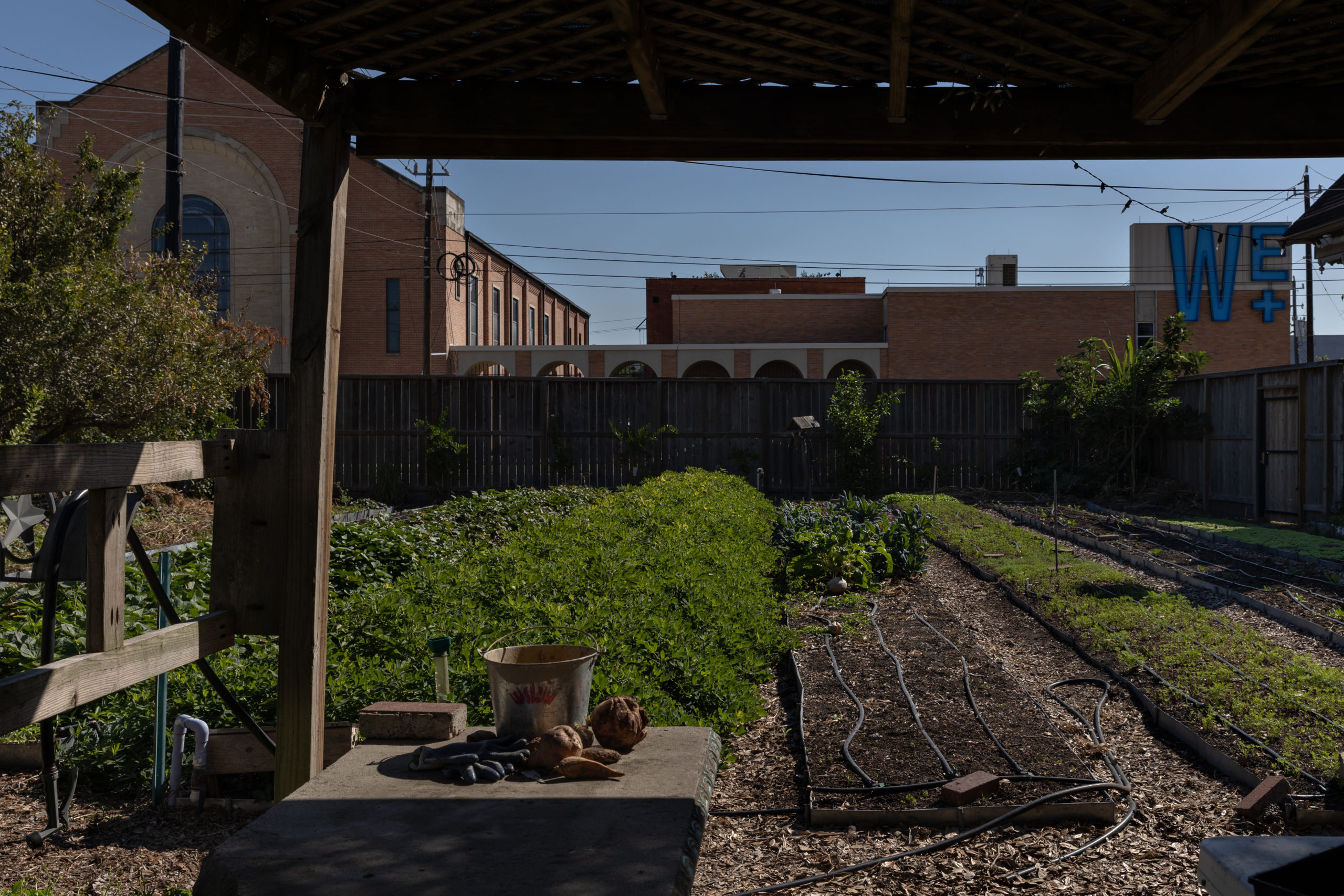
Donofry grapples with the somewhat abstract text, trying to connect it to the very concrete work of Casa. “Personalism is a way of meeting people where they’re at,” he says, and “We all belong to each other.”
Donofry is a recent graduate with the unusual degree combination of a major in sports marketing and a minor in theology. With his business major “I felt kind of stupid coming here,” but reasoned, “You’re only broke and 22 once” and took the plunge. He arrived in May, three weeks after graduation, not speaking “a lick of Spanish.” He’s been a quick study, and “now I translate documents.” One of his main duties is paying for and arranging travel for migrants once they’ve got a sponsor.
He recently bought plane tickets for 14 men and arranged for a bus to take them to the airport. (The local Catholic Charities often pays for the tickets.)
“I’m just a guy from the Philly suburbs,” he reflects with a broad smile. He was thrilled to find that a nearby bar was the gathering place for Houston’s Philadelphia Eagles fan contingent, and he’s gone every Sunday.
Louise has been up since 3 a.m., answering emails and working on the newspaper, so in the early afternoon she rests. But they never know who’s going to knock on the door.
Today it’s a wheelchair-bound Guatemalan man who lost his left leg above the knee while trying to jump a train in Mexico. Now he needs help getting on a plane to Florida, where a friend will take him in. The volunteers confer and determine that C.J. will take him to Catholic Charities in the morning, and that they will get him on the airplane.
The volunteers have noticed that his wheelchair is worse for wear, so someone goes back to a storage room and pulls out a new one, still in its box. While the chair is being assembled, the Guatemalan has time to talk to a reporter. First he spells out his name: Kenny Eduardo Vidal, age 33. Then he tells his story:
I came from Guatemala City to look for work. During the pandemic I lost the little work I had, and for this reason I left. I have an 8-year-old daughter at home and my mother is diabetic. We’re a poor family. I told my parents I would send money home for them and for her, but I haven’t been able to.
In Chiapas [Mexico] I was traveling with three Hondurans. We were jumping on a train but I slipped and the train took my leg. I was screaming without end but the Hondurans left me to die. A lady finally heard me and called an ambulance. This happened January 26, 2021.
My family doesn’t know what happened to me. I talked to my mother recently, and I told her I was well.
Kenny pauses to unwrap his stump, revealing a wet circle of blood in its middle. His deep eyes are bracketed between his black COVID mask and the black hair that sweeps over his forehead, so his gaze is penetrating.
After the hospital, I crossed Mexico by bus. I walked with crutches. It took three months. I would beg enough money for a short bus ride, and then get off and beg again. I suffered a lot. Demasiado [excessively]. But I’m determined to do what I came to do. To get a job and help my family. When my leg stops bleeding I can wear my prosthetic leg. With the prosthetic, I can do any kind of work.
Expressing this hope has brightened Kenny’s eyes. “Siguiendo pa’delante. [Moving forward.] Sigo vivo, gracias a Dios. [I’m still alive, thanks to God.]
C.J. enters the room and hands Kenny a bag packed with travel necessities and tells him that his transportation to the airport has been arranged. Kenny’s eyes seem to smile.
God has blessed me.
In the evening, the volunteers and many of the guests gather for the weekly mass. Louise leads the music on her guitar. In his homily, the priest asked the age-old question: “If God is good, why is there suffering?” He paraphrases his answer from the gospel: “The wheat suffered in being harvested,” he says. “Grapes suffer in being smashed to make wine.”
To someone whose life has always been comfortable, this is a hard teaching. For survivors of the Darien Gap, it may simply confirm the obvious truth.
Afterward, guests and volunteers gather for dinner, which has been prepared by the guests themselves. They discuss the events of the day and share family photographs.
Then the guests clean the dining area and retreat to their rooms to call their loved ones, wherever they may be.
In her home, a few blocks away, Louise relaxes by reading some theology, or perhaps a Dorothy Sayers mystery, until her day finally ends.
She’s not interested in retirement. “I’ll die with my boots on,” she says.
At lights out, everyone sleeps—if no guest is screaming too loudly as she remembers a trauma she suffered along the way.
Then there’s a knock at the door.
